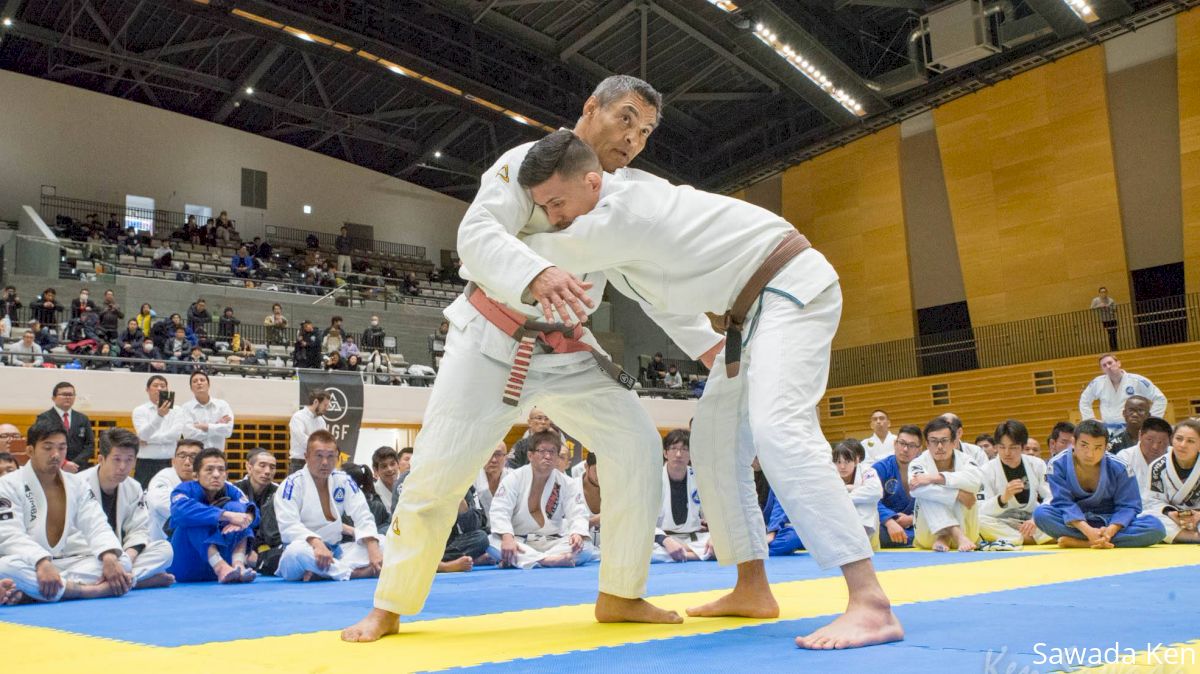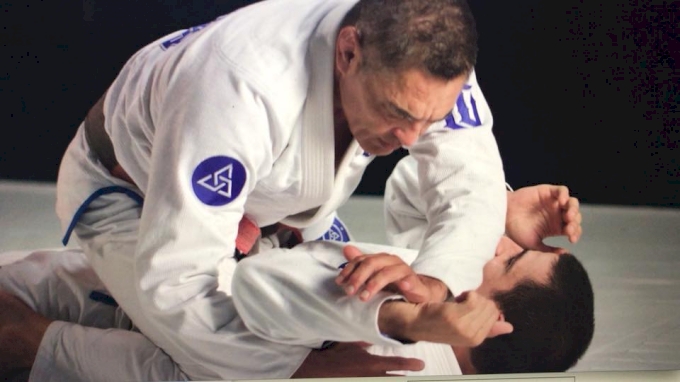Why Rickson Gracie's Views On Sport Jiu-Jitsu And Self-Defense Are Outdated
Why Rickson Gracie's Views On Sport Jiu-Jitsu And Self-Defense Are Outdated
Rickson Gracie has made many negative statements about sport jiu-jitsu practitioners.

By Josh Hinger
In 2007, I was traveling Vietnam for three weeks. One night at 4 AM, two drunk Irishmen who had an obvious disdain for Americans made some rather aggressive comments towards me in hopes of upsetting me. I calmly responded with an equally rude comment.
As the two guys entered my personal bubble, I knew a physical confrontation was unavoidable. I didn’t want to throw the first punch, so I did something to kick off the fight. I gave one of the guys a gentle nut-tap with the back of my hand. This of course got me punched in the face.
Once the fight began, I did not pull guard, invert, or feed his belt strap behind his leg. No, I simply lowered my level, grabbed his legs, picked him up, and dropped him on his head, followed by a quick mount and a few punches. Of course while I’m beating up the guy on the ground, the other guy is punching me in the back of the head. So I did the same thing to him. Double leg, slam, mount, punches. Done.
I was a blue belt at the time, and I hadn’t stepped on a training mat in over 18 months. The point here is that a sport jiu-jitsu practitioner who was severely out of shape, out of training, and mildly intoxicated easily disabled two assailants who simultaneously attacked him.
Recently, I read a quote by Rickson Gracie in "Blackbelt Mag" (February/March 2018 issue) stating, “Jiu-jitsu for competition doesn’t translate to jiu-jitsu as a martial art because of all the rules. And it’s not as related to life as it used to be.”
Additionally, he stated, “About 50 percent of the techniques used in tournaments develop terrible reflexes and positions for use in a real fight.”
It is well known that Rickson has made other negative statements about sport jiu-jitsu practitioners.
I have a problem with these statements and RIckson’s consistent belittlement of jiu-jitsu athletes who chose to exercise their skills in a tournament setting.
First of all, the sport-based branch of the activity does not negate the essence of a martial art. In fact, Merriam-Webster defines a martial art as “any of several arts of combat and self-defense (such as karate and judo) that are widely practiced as sport.” If that is not enough, Google defines a martial art as “various sports or skills, mainly of Japanese origin, that originated as forms of self-defense or attack, such as judo, karate, and kendo.” The word “sport” is in both definitions.
There’s not much debate that martial arts are sports. And certainly, having rules does not negate the utility of the martial art. As a sport, martial arts require rules. Without rules, very few people would care to practice them, especially not children. If there were no rules, I would just bite every single person who tried to touch me.

Rules are intended to keep people safe during live training exercises. Rules allow practitioners of jiu-jitsu to practice the art at an intensity that is close to maximum speed and effort. I believe this is far more useful in training than to practice very dangerous techniques at an impractically low level of speed and effort.
For example, practicing groin punches and eye gouging at maximum speed and effort for self-defense is not very practical. You cannot slowly and carefully eye-gouge someone. Ask yourself what is more useful in training, practicing safer, less-lethal techniques at maximum effort or very dangerous techniques (such as eye-gouging) at a very unrealistic speed at which an individual basically has to pretend to do it? One of the things that I have always loved about jiu-jitsu is that you can use it to compete with each other at 100 percent effort and no one has to get hurt (although sometimes people do).
Sport jiu-jitsu is very practical for self-defense. Sport jiu-jitsu as an activity promotes a laundry list of attributes that can help an individual become a formidable opponent against any non-professionally trained combat athlete.
Competitive jiu-jitsu promotes high levels of cardiovascular conditioning, balance, and positional awareness. Most importantly, competitions teach athletes how to manage high-stress, high-anxiety situations in which an opponent is attacking them with a high level of intensity.
Jiu-jitsu tournaments and the preparation leading up to tournaments actually train competitors to have excellent reflexes that can be used in a real fight. Sport jiu-jitsu athletes can move with such speed, precision, and agility that I truly believe they could execute a wide variety of jiu-jitsu techniques against an untrained assailant. In my opinion, Rickson’s assumptions fail because they assume that a sport jiu-jitsu athlete would naively choose to use niche technique for an inappropriate circumstance.
But sport jiu-jitsu athletes are experts at analyzing situations and circumstances on the fly and choosing appropriate responses regarding their body position, available grips, and weight distribution.
Just because a BJJ competitor chooses to pull guard in jiu-jitsu competition does not mean that he or she is stupid enough to pull guard in a street fight. Even the best competitive guard players know how to shoot highly effective double-leg takedowns, pass guard, mount, take the back, and submit.
Jiu-jitsu competitions require competitors to be able to improvise a game plan in a fraction of a second. It’s about being able to read an opponent's movements, understand what they are attempting to do, and cut them off and counter them before they can impose their will on the other person.
Sport jiu-jitsu competitors are better at this than anyone else. They have razor-sharp senses, finely tuned motor skills, and impeccable cardiovascular conditioning — and most importantly, they have mind that is trained to win. They are trained to dissect and solve positional problems in seconds. In my opinion, jiu-jitsu competitors will always run circles around non-competitors, and even more so against untrained aggressors.
Lastly, I would like to state that jiu-jitsu sub-groups should stop hating on other jiu-jitsu sub-groups. The existence of self-defense jiu-jitsu is no problem for any jiu-jitsu competitor. You don’t often hear high-level jiu-jitsu competitors belittling self-defense jiu-jitsu. I think it’s great if someone wants to train self-defense in their jiu-jitsu class. I also think it’s great when people want to enter jiu-jitsu competitions. But when someone with such a highly respected position in the jiu-jitsu community makes so many careless and rude comments about people who simply love jiu-jitsu, I can’t help but wonder why?
Why does someone so highly regarded and respected by the jiu-jitsu community feel the need to uplift themselves by diminishing others? At the end of the day, all jiu-jitsu people should support the growth of jiu-jitsu in all of its forms and styles.
Josh Hinger is an IBJJF black belt no-gi world champion representing Atos Jiu-Jitsu. Follow him on Instagram and Facebook.
Liked this article? You may also enjoy...
- A Question Of Age: An Over 30's Perspective On Adult vs Masters Divisions
- In Defense Of Jiu-Jitsu's Most Hated Rule: The Pros and Cons of Advantages
- How to Manage Your Mind on Tournament Day
- The Brutal, Painful Reality Of Training In A World-Class Jiu-Jitsu Gym
- Beware Of The False Champions With Medals They Don't Deserve
- Are Closeouts Good or Bad For The Sport?